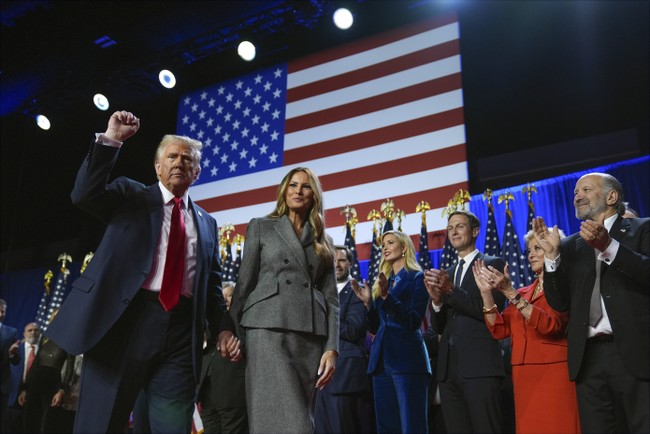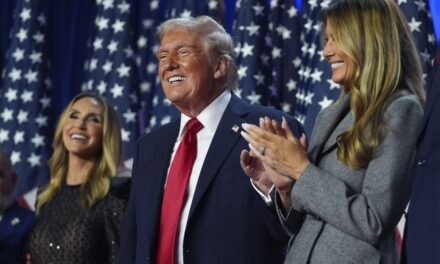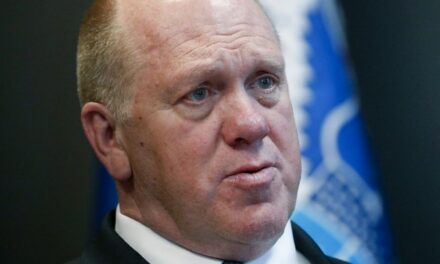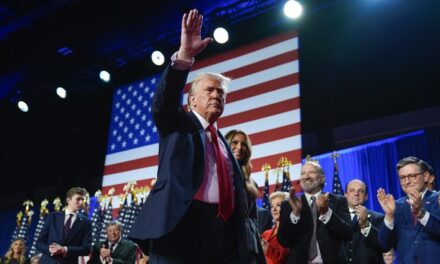We support our Publishers and Content Creators. You can view this story on their website by CLICKING HERE.

During this election, many of us on both sides were obsessed with polls, betting markets, rally sizes, and any sort of tea leaves we could read to gauge where this election stood. In my extensive coverage of the polls this year, one thing that stood out was how the left refused to accept the results of polling that didn’t tell them what they wanted to hear. This happens on both sides, but from what I could see, if people on the right thought a poll was suspicious, they would look at the crosstabs and tell you why it was wrong.
Advertisement
If people on the left didn’t like the topline results, however, they would accuse the pollster of bias and call it a day. One outfit in particular that endured a lot of criticism from the left was Rasmussen Reports. In fact, they were removed from both FiveThirtyEight and Nate Silver’s election models for being a “partisan” pollster.
The day after Trump won, I spoke with Mark Mitchell, the head pollster at Rasmussen Reports, about the election results and how vindicated he feels in light of them.
“What a pack of lying scumbags the entire industry is,” he said. “I got a lot of flack for saying that this was gonna be 1980s-style landslide. And I think it was a landslide, but as I said, Trump’s not gonna get as much as Reagan because there was a third-party spoiler, but the parallels are that back then, all the pollsters were lying. They were saying that the race was too close to call. This race was never too close to call according to my numbers, and they just ignored them.”
“So, yeah. I feel pretty vindicated,” he said. “People try and cherrypick our results to show that we’re inaccurate, but we did pretty good in the last few cycles, and I think we did even better now.”
Exclusively for our VIPs: The Democratic Party Has Some Real Soul-Searching To Do
Rasmussen’s final national poll had Trump +3 over Kamala, which was spot-on accurate. Their state polling was also remarkably on target, compared to their competitors. Rasmussen correctly called the winner in 93% of these states and stayed within the margin of error 79% of the time, demonstrating reliable precision. The average polling error was just -0.7 points, meaning their predictions were very close to the actual results overall. While there were some larger discrepancies in states like Texas and Nevada, Rasmussen’s polling was otherwise consistently on target, especially in high-profile states like Georgia, Pennsylvania, and Arizona.
Advertisement
If you take Texas out of the equation, their state polling was accurate to 0.2 points.
Mitchell explained that he had Michigan polling at Harris +1, but he also believed that Trump’s support might be stronger in the state than the polls suggested. He felt his polling leaned about two points to the left, meaning Trump could potentially sweep the battleground states — which, of course, he did. Mitchell added that this polling accuracy was positive news and even suggested that his work may have influenced the industry, pushing other pollsters to improve their accuracy.
Mitchell addressed criticism from Nate Silver, who “downranked us as Republican pollsters,” despite Rasmussen not showing statistical bias. He discussed a controversy where leaked emails showed that Rasmussen had shared unreleased poll results with the Trump campaign, noting that Rasmussen shares unreleased polling with many people and even has a subscription service for it.
He highlighted the irony of Ann Seltzer, a respected pollster, releasing two conflicting polls: one showing Trump up by 18 and another with Harris up by 3. According to Mitchell, the Harris +3 poll was “communicated early to Democrat circles,” and they were “ecstatic and laughing and because they really needed hope, and they got a gold standard pollster handing them exactly the copium they needed.”
Advertisement
He suggested Seltzer’s move was an attempt to help Democrats maintain morale, even if it compromised her credibility, adding that her past polls showing Trump up double digits in Iowa reflected the reality. “So what was funny is she destroyed her credibility to help stop Trump, and she was actually a damn good pollster.”
Of course, there is quite a bit of anger aimed at the polling industry right now for getting this race so wrong again. It appears to be driven by people who don’t want to see the truth, rather they want to be told what they want to hear.
“I think there’s a lot of weak-willed people who kinda don’t mind authority figures loosening their credibility to reinforce their views of reality,” Mitchell said. “I think there’s a lot less of those people on the right. Because I don’t think my audience would say, ‘Mark, we wanna see positive Trump numbers.’ That’s not what they want,” he explained.
As for the Democrats’ hopes that the abortion issue would motivate their base and propel Kamala Harris to victory, that didn’t come close to panning out. Mitchell noted that there is only a small group of voters who prioritize abortion above all else, but overall, most Americans support strong limitations on abortion, even among those who identify as pro-choice.
So, what’s going on in the polling industry? Mitchell compared the polling fails of the past few cycles to woke Hollywood, particularly in how external pressures and internal constraints can influence their work. He explains that just as Disney is driven by stockholder interests, they are also constrained by diversity and equity demands. According to Mitchell, pollsters are similarly affected by pressures from higher-ups. Mitchell says, “They wanna make money,” but are often hampered by “multiple layers of constraints and limitations,” such as hiring practices that prioritize diversity over experience, leading to subpar outcomes. He expands this comparison to the polling industry, stating that “Nate Cohn really wants to be an accurate pollster,” but is likely hindered by “some insane managing editor” who pushes a particular agenda. Mitchell believes that, despite the pollsters’ intentions, these pressures result in misleading or inaccurate data, likening it to how a movie made under such constraints can end up as “garbage.”
Advertisement
“Nate Cohn secretly wants to be accurate and isn’t allowed to be,” Mitchell believes.
When I asked Mitchell if he thinks there will be more honesty from the polling industry going forward, he didn’t have high hopes. “I don’t think so,” he told me. “I think Nate Silver has a business model that doesn’t require accuracy. I think 538’s got bottomless money and will continue on as a propaganda operation.”
Mitchell is doubtful that media organizations will hold themselves accountable for claiming that Kamala Harris was winning. He predicts that the real change will come from the rise of independent media, noting that “there were a gazillion streams” on election night, and likely more people watched independent streams than traditional cable news.
If you enjoyed our election coverage and find interviews like this invaluable for staying informed, now is the perfect time to show your support by becoming a VIP member. Our ability to deliver this in-depth coverage is thanks to the backing of our VIP community. To celebrate Trump’s victory you can now take advantage of our special offer and get 74% off your membership with the code POTUS47.

 Conservative
Conservative  Search
Search Trending
Trending Current News
Current News 







